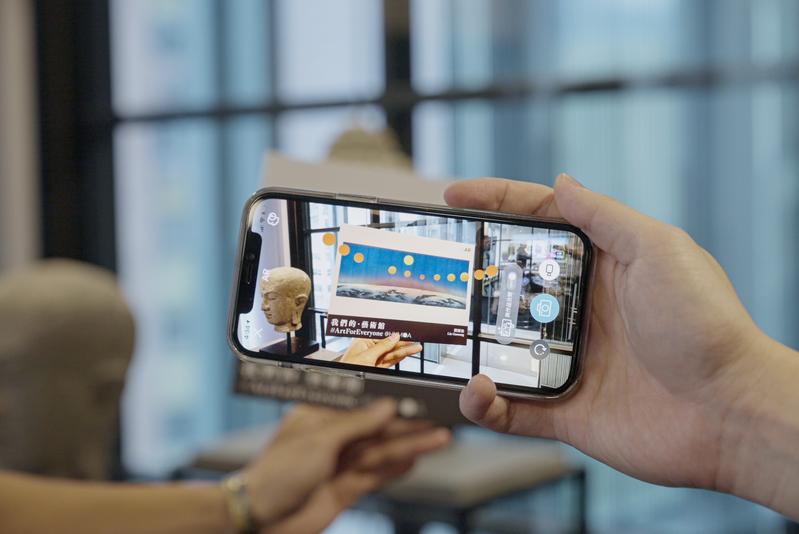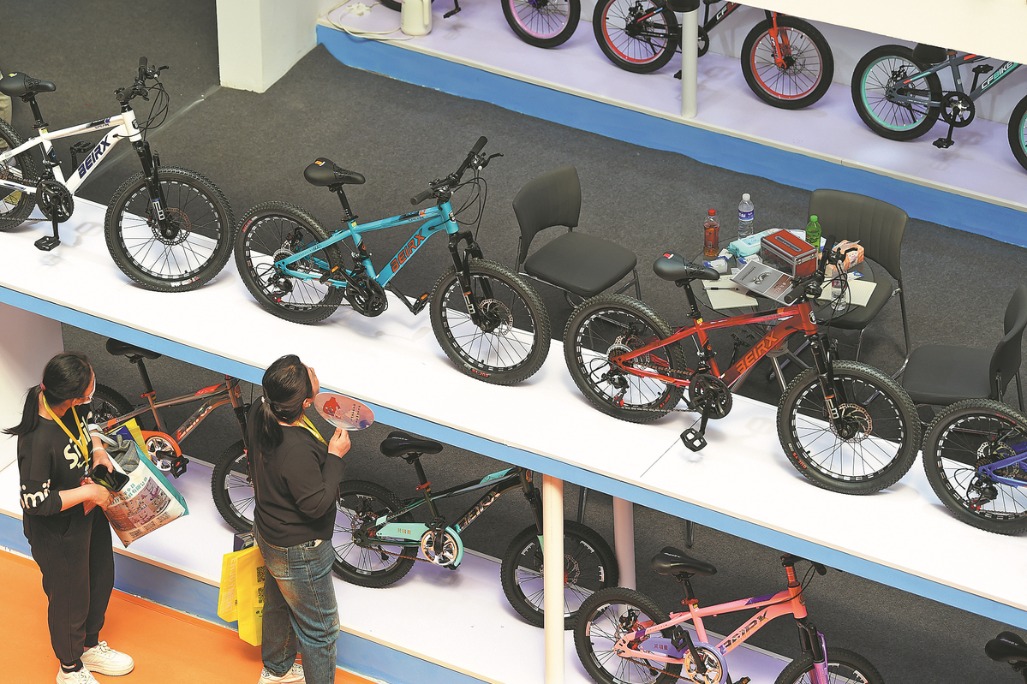Looking beyond the real world

The metaverse frenzy has caught up with global tech giants eager not to miss out on the 'next big thing' — a virtual-tangible world integration. Zeng Xinlan reports from Hong Kong.

Imagine yourself living in a world in the next five to 10 years where you could move beyond the constraints of screens or beyond the limits of physics by teleporting as a hologram to be present with your colleagues or loved ones.
Through the lens of augmented reality and virtual reality, you could be fully immersed in a "digital twin" — the exact counterpart of the tangible world — to be truly present with another person. Are you tempted?
Facebook CEO Mark Zuckerberg depicted a metaverse world as such at Connect 2021 — the annual conference hosted by the United States online media and social networking giant to bring together small-business owners to celebrate their entrepreneurial spirit. Rebranded as "Meta" the same day, Facebook has set the wheels in motion toward a metaverse. Zuckerberg sees the metaverse as the future internet.
Big businesses have begun adopting the technology world's latest buzzword. Fearing they would miss out on the "next big thing", tech incumbents like Microsoft, video-game platform Roblex, and Chinese tech giants Tencent and ByteDance have been crafting the software and hardware that could fit in this future world.
While conglomerates vying to climb the ladder and be the first to carve out something from their metaverse-adjacent assets, many layers of the metaverse remain a puzzle. To begin with: What exactly is a metaverse?
The word "metaverse" consists of the prefix "meta" — a Greek word meaning "beyond" — and "universe".
"There's no single unified definition for metaverse. Everyone has different concepts," said Lucas Cheung, president of Gusto Labs — a Hong Kong-operated branding and technology agency providing immersive technology (such as augmented reality, virtual reality and mixed reality) solutions.
Although perceptions may vary, the most widely agreed fundamental attributes of a metaverse include being present, persistent, shared and user-generated, offering unprecedented interoperability and economic function.
Present: A feeling of being present using devices, such as VR goggles, to extend the sense of sight and electronic skins to increase the sense of touch. "You're right there with another person or in another place," Zuckerberg told Connect 2021, calling it the "defining quality" of the metaverse.
Persistent: All events in the metaverse occur in real time with permanent effects recorded on the blockchain. The metaverse space continues indefinitely, whether or not you're online or offline. It never "resets", "pauses" or "ends".
Shared: It's essentially a shared virtual space that people can access through different devices.
User-generated: All the activities or contents are generated or programmed by users, as opposed to developer-created contents, which is often the case with today's internet space where users can only experience within the parameters of existing platforms.
Unprecedented interoperability: It's like in real life where you have a fixed identity with links to your appearances, home address and bank savings, regardless of time and space, in the metaverse. Your avatar, data and digital assets are also permanently attached to your digital identity. "It's the 'digital twin' of the tangible world," said blockchain pundit Pindar Wong. He is also the chairman of internet financial infrastructure consultancy VeriFi (Hong Kong).
A "digital twin" is a digital representation of real-world objects, process or services, such as a jet engine or an automobile production line. It's essentially a mathematical model, or a computer program based on the real world to test and predict products or processes.
"What we can do is anything that can be mathematically modeled on. What we can't do are things that cannot be mathematically modeled on and which have high emotional content," Wong said.
Economy function: Individuals and businesses will be able to create, purchase, sell and own digital assets often in the form of non-fungible tokens. "It will unlock a massively larger creative economy than the one constrained by today's platforms and their policies," Zuckerberg said.

Accelerated virtualization
The metaverse frenzy comes amid a profound economic shift — the added value of the internet has peaked and started to fade. With the concept of virtual-tangible world integration, it has huge opportunities in changing social, content, gaming and the office economy, which both tech incumbents and startups simply can't afford to miss, Zuo Pengfei, an associate researcher at the Institute of Quantitative and Technological Economics of the Chinese Academy of Social Sciences, told Xinhua News Agency.
The COVID-19 pandemic has also given the buzzword a push as it accelerated the virtualization of society — people are spending more hours online and upgraded digital life from a supplement to a norm of people's lives, in parallel with the physical world, according to the 2020-21 Metaverse Development Research Report published recently by Tsinghua University.
"People are more used to operating their lives over a network," Wong said, adding that the pandemic has changed people's perception of a digital world — from being secondary to the real world and be equal.
More digital-ready groups, especially the digital-native generations like Generation Z, will drive the sales in the metaverse, said Nicholas Lau, founder of Wear — an international luxury and fashion NFT marketplace launched in December in Hong Kong. The company has a virtual store called Wear Metaverse, which allows customers to try, buy, sell and showcase luxury digital garments.
"People are already buying assets within the gaming environment and showing them off as their skins," he said, referring to video characters' clothes, adding that he expects the new generation also to be among the digital-luxury consumers.
Lau expects the metaverse to strengthen interaction among online stores to provide customers better virtual shopping experiences. "The fashion industry has always been slightly behind technology development," he said.
The application of technologies under the metaverse umbrella in the fashion business has exploded during the COVID-19 pandemic, which puts a pause on physical fashion shows, Lau said. "The technologies are becoming more accessible for brands, especially emerging designers."

'Inevitable' future?
In the art sector, the metaverse could bring artists a new way of monetization as the creator could directly present their pieces to audiences instead of having to rely on middlemen, like in the old days, Cheung said. "It (the metaverse) will make the whole art space more sustainable in the future by allowing more freedom for a creator to focus on actually creating," he said. It could also give rise to digital art as people could own digital assets, he added.
"The metaverse is definitely an inevitable future," Cheung said, adding that the maturity of technologies like augmented reality, virtual reality and blockchain, as well as big businesses like Facebook, have moved society closer to the concept's actual execution.
"It's a very ambitious goal and I do believe it's executable," he said, referring to Zuckerberg's pledge to bring the metaverse to the mainstream in the next five to 10 years.
An augmented-reality enthusiast, however, has reservations. "I don't think it's really possible in five to 10 years," said Robbie Hu, who's interested in creating digital art in the augmented-reality format.
He said challenges still exist not only in technology maturity, but also human biology as the current devices are far from comfortable for users to wear for a long time. "The ones we have are impossible for people to wear for more than one or two hours. I'm an enthusiast but I still cannot stand it. So how could you persuade the general public to do it?"
Blockchain pundit Wong warned that a lack of open protocols may stall the metaverse as the inevitable future of the internet. "I don't think it's inevitable. If I want to talk about the future of the internet, I would need to have an open protocol where it's a level playing field for everyone."
Wong is worried that netizens are too caught up with the buzzword, focusing overwhelmingly on the entertainment side of the story instead of the industrial side. "The entertainment aspects are important, but when you look at the opportunities, how do you carry out the experiment from an industrial, educational or health base. That's something new."
The business-to-business dimensions are more strategically relevant to the Chinese mainland and Hong Kong, he said, suggesting that relevant parties should study South Korea's approach to promoting metaverse innovations for industrial purposes in manufacturing, medicine, construction, education, retail and national defense.
The South Korean government launched the "Metaverse Alliance" in May, which includes more than 200 companies and institutions, such as Samsung, Hyundai Motor Co and SK Telecom.
As digital payments mature, Hong Kong and the mainland have an edge in developing a metaverse, Wong said. "Hong Kong should coordinate with the necessary integration standardization, such as a Hong Kong-edition metaverse alliance."
- China activates Level-IV emergency response to flooding in 5 provinces
- Xi pointed way for Xiamen's prosperity
- Aircraft carrier's visit sparks national pride in HK
- Ten photos from across China: June 27 - July 3
- Iconic Belgian music festival to make China debut
- Taiwan youth urged for more participation




































